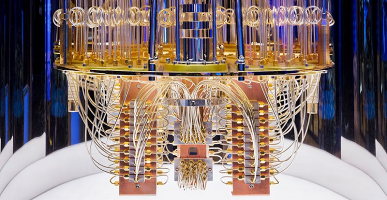Events
Why Mathematicians Are Attracted to Quantum Algorithms
22 11 2022
Mathematicians have actively joined the search for quantum algorithms as no modern technology can do without this science. Virtual reality modelling, artificial intelligence, neural networks, big data analytics, state-of-the-art cryptography and data security are just a few. One of the biggest issues is increasing the power of computing resources. In the past, this used to be addressed by building supercomputers and by distributed computing systems (in the cloud). In particular, great progress has been made in the development of the theory of parallel algorithms. However, technology needs are growing even faster.
That is why quantum computers and quantum algorithms hold the greatest promise. Physicists started talking about such computers 35 years ago. The potential of the new technology is far greater than that of existing computing technologies, but there are also many barriers and obstacles along the way, and they are so serious that one just wants to throw up one’s hands and abandon the idea.
While many experts doubt that quantum computers can be made even slightly more powerful, the National Institute of Standards and Technology (NIST), a hugely influential organisation in the USA, declared in 2016 that there would be no time for debate once quantum computers were up and running, and that the market would not be ready to react to new and very serious threats. That is why six years ago, a competition was launched to develop and implement algorithms guaranteeing security of data storage and electronic transmission of information, and resistant to the quantum computer attacks. The first four winners were announced in 2022. This will help protect our electronic payments, electronic signatures, digitised personal health data, and business information. Incidentally, all the new algorithms are based on modern advances in mathematics. Another important argument in favour is that quantum computers are already working and learning to solve increasingly important problems.
How do quantum computers work and why are mathematicians among the most suitable specialists to use them? In quantum computing, instead of the usual logical bits, we have qubits, which exist according to the rules of linear Hilbert spaces. With n qubits, we can form 2n different states, all of which are combined to form a very rich linear combination (superposition). Thus, adding one (just one) extra qubit makes our quantum computer twice as powerful.
Can we say that experimental results that confirm the fundamental superiority of quantum computers over traditional supercomputers have already been produced? How many qubits are used in the largest quantum computer? How long can modern quantum computers calculate without error? Direct investment in quantum computing was €93 million in 2015, €187 million in 2019, and €1 billion in 2021. The forecast is that over the next few years, these amounts are to grow to €3-5 billion annually.
In 2019, Google’s quantum computer used 53 qubits for calculations. In 2021, a group of Chinese researchers announced the launch of the Zuchongzhi computer with 66 integrated qubits. The theoretical power of the computer thus increased as many as 4096 times. In 90 minutes, they solved a problem about 300 times more extensive than Google experts managed to do. In November 2021, IBM announced that it had built a 127-qubit quantum computer called Eagle. The number of qubits doubled. The company promised that a 433-qubit computer will be up and running by the end of 2022, followed by an 1121-qubit computer in 2023.
Why are mathematicians so interested in quantum algorithms? This is a highly relevant contemporary scientific and application challenge. Maths graduates are ready to quickly master quantum mechanics. This is the set of essential tools on which quantum algorithms are based, leaving new quantum field theories to physicists. Mathematicians study vectors, complex numbers, linear Hilbert spaces, and the basics of the probability theory. It is very important to acquire knowledge of the classical algorithm theory. There is another popular view: classical algorithms hinder the understanding and development of original quantum algorithms that work differently from classical logic.
In mathematics, some new structure is often chosen, which contains the elements and operations we can perform. The properties of this structure are then analysed and used to solve various problems. This time, such a structure is defined on the basis of the postulates of quantum mechanics. But the prize is exceptional: we can expect to create computing resources of fantastic size. Then we will be able to know Nature much more accurately, and perhaps extend the possibilities of modelling. It is great to see that the number of quantum computing enthusiasts in Lithuania is growing as well.
Prof. Raimondas Čiegis, a full member of the Lithuanian Academy of Sciences
Translated by Diana Barnard
